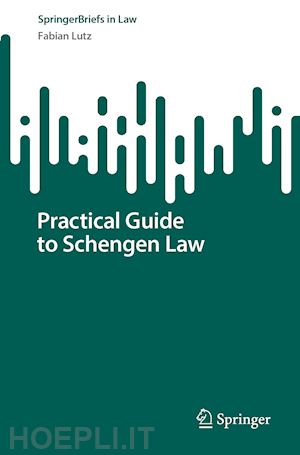
Questo prodotto usufruisce delle SPEDIZIONI GRATIS
selezionando l'opzione Corriere Veloce in fase di ordine.
Pagabile anche con Carta della cultura giovani e del merito, 18App Bonus Cultura e Carta del Docente
Schengen law is legally complex and, at the same time, foundational for the free movement objectives of the European Union. This "Practical Guide to Schengen Law" seeks to explain the specific features of Schengen law and its differences from normal EU law. It focuses on the territorial scope of application of Schengen law (variable geometry) and on the determination of the substantive scope of the Schengen acquis. It also includes replies to frequently encountered practical questions arising in that field.
In addition to its descriptive function, this guide also aims at closing a gap in the scholarly analysis of Schengen. The substance of the Schengen acquis has already been subject of numerous publications, with specific emphasis on: border controls, security and human rights, institutional balance and implementation. However, there has been little scholarly attention to the challenges resulting from the application of the legal criteria, introduced in 1999, for distinguishing Schengen-related developments of the EU law from the broader Justice and Home Affairs EU law and the resulting legal and political problems.
1. Introduction.- 2. The development of the Schengen acquis.- 3. Scope of Schengen acquis in 2024.- 4. The territorial scope of Schengen.- 5. Outcome of research interviews with “Schengen veterans”.- 6. Conclusions.- Annex.
Fabian Lutz is Senior Legal Expert, working in the European Commission's DG Migration and Home Affairs. He has been working for the European Commission in Brussels since 1996. He has been responsible for migration policy since 2000 and directly oversaw the elaboration of several pieces of the EU's migration acquis as well as the Schengen acquis covering the field of Legal migration (2001 proposal on economic migration; Directive 2004/114/EC on third country students and Directive 2005/71/EC on third country researchers; 2019 Fitness check on EU legislation on legal migration); Irregular migration (Carriers Liability Directive 2001/51); Return (Return Directive 2008/115/EC; the Commissions October 2015 "Return Handbook") and Schengen (2013 and 2021 amendments of the Schengen Borders Code; 2022 revision of the Schengen Handbook for border guards; 2021 Screening proposal).
Next to his work as civil servant, Fabian drafted several publications in which he provided first hand insight and analysis on the files he oversaw. In the 2022-23 academic year, he was detached from the European Commission to the European University Institute (EUI) in Florence for an EU fellowship.











Il sito utilizza cookie ed altri strumenti di tracciamento che raccolgono informazioni dal dispositivo dell’utente. Oltre ai cookie tecnici ed analitici aggregati, strettamente necessari per il funzionamento di questo sito web, previo consenso dell’utente possono essere installati cookie di profilazione e marketing e cookie dei social media. Cliccando su “Accetto tutti i cookie” saranno attivate tutte le categorie di cookie. Per accettare solo deterninate categorie di cookie, cliccare invece su “Impostazioni cookie”. Chiudendo il banner o continuando a navigare saranno installati solo cookie tecnici. Per maggiori dettagli, consultare la Cookie Policy.